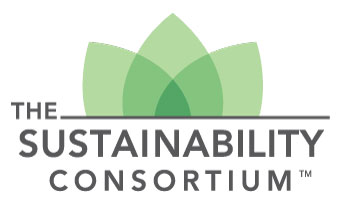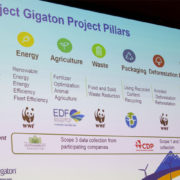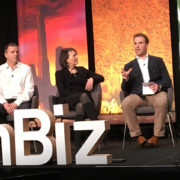To Fill A Void, Companies Deliver More Sustainable Goods
By: Euan Murray, CEO of TSC
Article from GreenBiz

From Gary Larson’s “Far Side” cartoon
Nature abhors a vacuum. Or so my old physics teacher and Gary Larson’s “Far Side” cartoon liked to say.
And so it is with action on sustainability. In this time of political uncertainty in the U.S., Europe and beyond, it is heartening to see civil society and the private sector rushing forward to fill the gaps.
From humble beginnings in CSR and carbon footprinting, we are seeing the emergence of global movements such as the Science-Based Targets initiative, EU Product Environmental Footprint and the Walmart-inspired Project Gigaton. These initiatives bring together the NGO community, sustainability scientists, regulatory bodies and companies large and small. They are about using the best sustainability science to deliver the win-win of shrinking sustainability impacts at the same time as unlocking business growth.
We also see this movement in our newly published TSC 2017 Impact Report. Our report from last year showed the enormous benefits we get from consumer goods but also their enormous sustainability price tag. The products we all buy and use are responsible for 60 percent of global greenhouse gas emissions, three-quarters of forced and child labor, and nearly two-thirds of tropical deforestation.
In this time of political uncertainty in the U.S., Europe and beyond, it is heartening to see civil society and the private sector rushing forward to fill the gaps.
In 2017, we complete that story, laying out our strategy to turn Blind spots into Hotspots into Action into Growth (BHAG). Our BHAG here is to deliver sustainability impact at scale. In an increasingly resource-constrained world, we know that successful companies must decouple their future growth from social and environmental issues.
Four trends stand out in the data from our recent report:
Firstly, increasing scale. Over 2,300 companies are reporting on the social and environmental hotspots across the value chain of the products they make. That’s a 25 percent increase on last year and represents products worth over $200 billion in annual retail sales. We expect the growing momentum to continue in the years to come.
Secondly, measurement is leading to action: When we followed up with them, 40 percent of suppliers reported that they’d taken action to improve their sustainability performance and get a better score. Of those, the most common actions were to engage their own suppliers or to set up supplier reporting systems (25 percent); to set up new systems and resources to collect internal data (21 percent); to make changes to processes or products (14 percent); and to communicate with and organize internal stakeholders (11 percent). This shows that market forces can be used to drive sustainability performance across the value chain.
Thirdly, there’s a long way to go. The most common response to one of our questions is still “I am unable to determine at this time” and more than half of all responses score less than 10 percent. So there’s a risk that we in the sustainability community get stuck in our bubble, and we forget that companies are still out there that think they “don’t have any greenhouse gas emissions because they don’t have greenhouses.” We need to be ever mindful of those organizations and make sure we are building programs and approaches that help them get started, too.
And lastly, there is already lots to celebrate. In our “64 and over club” we see a set of industries performing well against the most important hotspots we’ve identified. Lettuce and Leaf Vegetables (64 out of 100), Lead-Acid Batteries (69 percent) and Diapers (65 percent) are just some categories where companies are already getting the basics right.
And while the supply chain of a lettuce doesn’t have much in common with a lead-acid battery, some common themes stand out. These include the importance of strong links between players in the supply chain and the positive impact of external pressure from regulatory bodies, NGOs and consumers.
So, as I look to what comes next, I see the importance of collective action to build the foundations on which companies can compete to deliver results for their sustainability plans as well as their shareholders. And, unlike Gary Larson, I know we all have the capacity to deliver.

Euan Murray
CEO, The Sustainability Consortium







